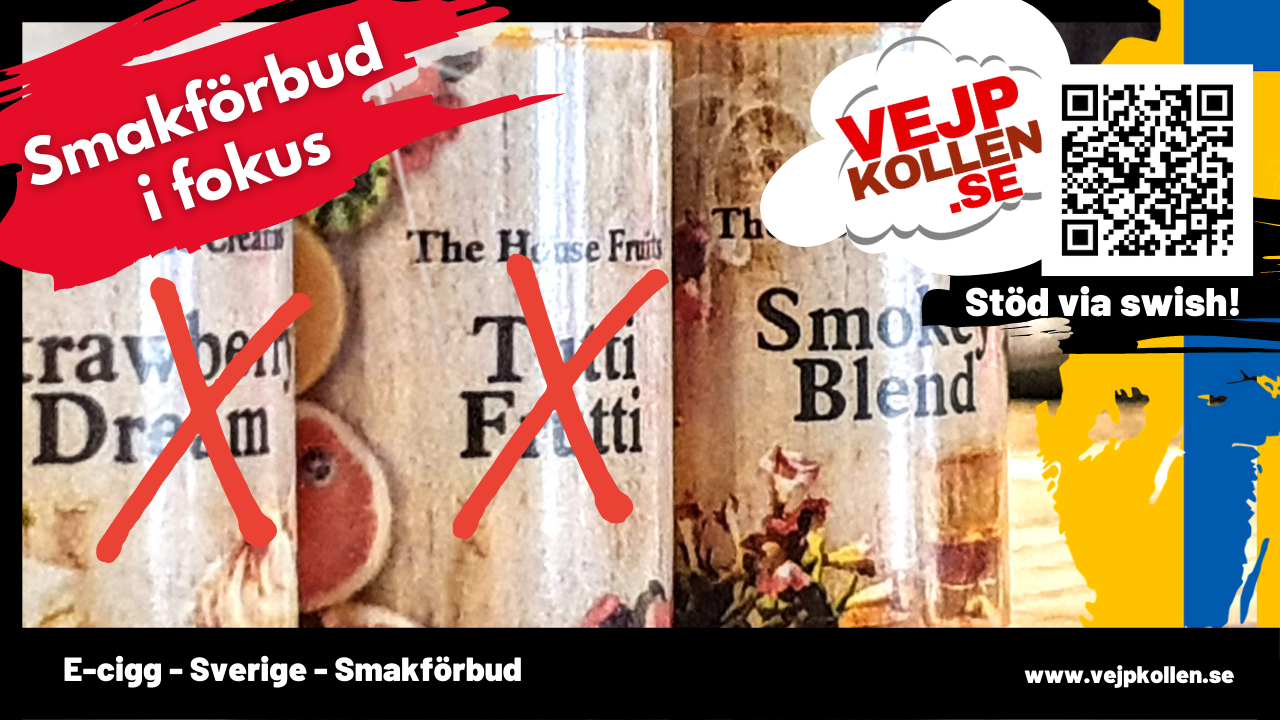Arbitrary, harmful to public health and unjustified. The Moderates firmly reject the government's proposal for a taste ban on e-cigarettes.
"It is important to protect alternative products that can make it easier for more smokers to quit smoking," the Moderates write in a motion to Parliament.
The debate on a possible ban on flavors in e-cigarettes and e-liquid has now gained momentum among the parties in Parliament. A total of five motions have been submitted for the discussions and to the Social Affairs Committee, which will now consider the matter. And it is mainly critical views that set the tone. The Moderates believe that a taste ban runs counter to the Riksdag's objective of minimizing harm in tobacco and nicotine policy.
"More concrete measures are needed to prevent people from getting sick or dying from smoking. At the same time, individuals themselves are responsible for their decision to smoke. It is important to protect alternative products that can make it easier and simpler for more smokers to quit smoking", the Moderates write in a motion to Parliament.
Goes against parliamentary decision on harm reduction
The Moderates believe that the taste ban is contrary to the direction of tobacco and nicotine policy decided by Parliament last year. The government's so-called ANDTS strategy was voted down at the same time as the Riksdag decided to introduce a harm minimization perspective in the ANDTS strategy.
"The Government should have drafted this bill in line with Parliament's previous decisions. The Riksdag believes that we should take into account the varying harmful effects that different tobacco and nicotine products can cause. Introducing a flavor ban for e-cigarettes is contrary to this approach," the Moderates write.
"Prevents development and innovation"
Government wants all flavored e-liquid "that do not give a smell and taste of tobacco" should be banned from sale in Sweden. According to the government, such a ban would greatly reduce the attractiveness of e-cigarettes, with the aim of preventing young people from being attracted to the products. At the same time, the government admits that the ban will also lead to fewer adult smokers choosing e-cigarettes over smoking.
"The risk is that a flavor and fragrance ban will prevent development and innovation in an area that could reduce the number of smokers. It is important that smokers continue to have access to alternatives to traditional cigarettes that make it easier to quit smoking. For some, this could be e-cigarettes. E-cigarettes are not a healthy product and should continue to be regulated, but not through an arbitrary taste ban. " write the Moderates.
Few young non-smokers use e-cigarettes
According to the Moderates, a sweeping ban is not justified by the risk of young people taking up e-cigarettes. The use of e-cigarettes is extremely limited in Swedish society, according to the Moderates. According to a survey by CAN in 2020, only one percent of the population, aged 17-84, had used e-cigarettes at some point in the past month. About half of these, or just under half a percent, were daily users according to CAN. Smokers of traditional cigarettes were more likely to have also used e-cigarettes (4%), compared to those who did not smoke traditional cigarettes (1%).
"It can therefore be concluded that e-cigarettes and e-liquids, despite being flavored, do not appear to be a product with particularly strong appeal. At least not for people who are not or have not been traditional smokers. A flavor ban, which is a very far-reaching regulation, can therefore not be justified to reduce the attractiveness of e-cigarettes for non-smokers. " write the Moderates.
Subjective about what will be allowed
The lack of clarity in the bill is also criticized by the Moderates. According to the party, both manufacturers and inspection bodies will have to work with subjective assessments in order to apply the restrictions.
"The flavour ban would create a complicated process for the authorized body to assess which flavours and fragrances are allowed or prohibited. This would risk creating an extremely difficult situation for manufacturers and importers and continuous uncertainty over which additives and flavors are allowed. In practice, an unreasonable amount of responsibility will be placed on individual officials to determine the application of the legislation. We consider it impossible for Parliament to accept such a proposal." write the Moderates.
Welcoming concrete measures
When the government presented its new ANDTS strategy, it commissioned the National Board of Health and Welfare, in collaboration with the Public Health Agency of Sweden and SBU, to investigate the relative risks of different nicotine products. The government also wants, in line with the Riksdag's decision, to build a national competence center to deal with issues relating to alcohol, drugs, doping, tobacco and gambling. This is something that the Moderates welcome.
"The Government should urgently implement Parliament's decision. Through a national competence center, preventive work could be significantly strengthened and quality assured. It could really make a difference to public health." write the Moderates.




